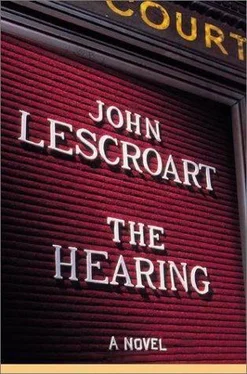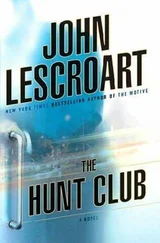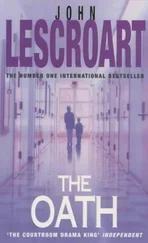John Lescroart - The Hearing
Здесь есть возможность читать онлайн «John Lescroart - The Hearing» весь текст электронной книги совершенно бесплатно (целиком полную версию без сокращений). В некоторых случаях можно слушать аудио, скачать через торрент в формате fb2 и присутствует краткое содержание. Жанр: Триллер, на английском языке. Описание произведения, (предисловие) а так же отзывы посетителей доступны на портале библиотеки ЛибКат.
- Название:The Hearing
- Автор:
- Жанр:
- Год:неизвестен
- ISBN:нет данных
- Рейтинг книги:3 / 5. Голосов: 1
-
Избранное:Добавить в избранное
- Отзывы:
-
Ваша оценка:
- 60
- 1
- 2
- 3
- 4
- 5
The Hearing: краткое содержание, описание и аннотация
Предлагаем к чтению аннотацию, описание, краткое содержание или предисловие (зависит от того, что написал сам автор книги «The Hearing»). Если вы не нашли необходимую информацию о книге — напишите в комментариях, мы постараемся отыскать её.
The Hearing — читать онлайн бесплатно полную книгу (весь текст) целиком
Ниже представлен текст книги, разбитый по страницам. Система сохранения места последней прочитанной страницы, позволяет с удобством читать онлайн бесплатно книгу «The Hearing», без необходимости каждый раз заново искать на чём Вы остановились. Поставьте закладку, и сможете в любой момент перейти на страницу, на которой закончили чтение.
Интервал:
Закладка:
The judge wanted unassailable clarity on this point. 'Mr Hardy, did you say even one word about this case in my chambers?'
'No, your honor.'
'Did I?'
Again, Hardy said that he did not.
'Does this satisfy you, Mr Torrey?'
The prosecutor swallowed, clearly feeling that if he could get out of this without any further damage, it would be a victory. 'Perfectly, your honor.'
Hill nodded brusquely. 'Then if you'd be so good as to call your first witness.'
Another of the many ways that a preliminary hearing differed from a trial was that there were no opening statements from either side. The prosecution simply began by calling witnesses, whom the defense could cross-examine, and introducing evidence, as they would at trial. When the DA was finished, the defense could then present its own witnesses and evidence.
Torrey took his chastised self back to the prosecution table. Hardy returned to his chair, thinking that at least the judge was equally intolerant of both sides. All things considered, this was terrific news.
Earlier in the week, Freeman had bet two hundred dollars that he could predict every witness in the order that Torrey would call them throughout the day and – perhaps foolishly, given it was David – Hardy had taken the bet. Now the old man leaned across Cole and whispered, 'Strout.'
Two seconds later, Torrey stood on the other side of the room. 'The People call John Strout.'
The coroner rose from one of the wooden theatre seats on the prosecution side of the room and made his long-boned way up the now frankly talkative center aisle, through the bar rail, to the witness chair. Strout appeared as a witness in a courtroom no less than once a fortnight and as he took the oath, he projected his usual relaxed confidence.
As Torrey stood to begin his questioning, Hill lifted his gavel and touched it down lightly. The decibel level dropped a few points, Torrey greeted Strout, and the hearing had begun.
'Dr Strout, for the benefit of the court, can you tell us briefly your occupation, as well as the training and experience that qualify you for that position?' Strout quickly qualified as an expert and gave the preliminary information about the case. In about ten questions, Torrey got to the point. 'Doctor, what killed Elaine Wager?'
Strout leaned back in the witness chair and crossed his legs. 'She was shot once in the back of the head at point blank range with a twenty-five caliber bullet. Death was instantaneous.'
'And the manner of death?'
'Death at the hands of another – homicide.'
As Hardy listened to the uncontested testimony, his spirits continued in their downward spiral. The prosecution, after all, only had to prove two things and it was already halfway there in less than five minutes. But, he thought with relief, that's over now. Homicide has been established. The second half, as Yogi Berra would say, was ninety per cent of it. But if he thought that things couldn't get more depressing from here, he was mistaken.
Torrey: 'Now, you carefully examined the deceased body in your forensics laboratory, did you not?'
'I did a complete autopsy, yes, sir.'
'And during this autopsy, did you discover any other injuries to the body?'
'I did.'
'Would you please describe them for the court?'
Strout, in his element, turned slightly and spoke directly to the judge, describing in homespun terms the gash on Elaine's neck, the broken ring finger, the damage to her earlobes where the pierced earrings had been pulled out. By the time he'd finished the short recitation, the susurrus in the gallery had ceased. Torrey introduced the eight-by-ten color photographs of Elaine that documented all of this testimony and Judge Hill spent several minutes examining them minutely, leaving Strout on the stand while he did so.
When he finally got the pictures back and entered as People's Exhibits, Torrey told Strout he had one more question. 'These injuries, Doctor, were they administered before or after the decedent's death?'
Strout replied, 'From a medical standpoint, it's impossible to say with certainty in the cases of the neck and ear injuries. Certainly near to the time of death, say within an hour. The finger, however, was broken after the decedent's heart had stopped pumping blood.'
'In other words, after she was dead?' In his laconic drawl, Strout granted that death usually went along with when the heart stopped and stayed that way. A ripple of amusement – tension breaking in the gallery – greeted this reply. Torrey let it die out, then passed the witness.
Hardy stood up. 'Dr Strout,' he began, 'the injuries you described earlier, including the gunshot wound, the pictures we've seen – was that the extent of damage to the decedent's body?'
The witness considered for several seconds. 'Yes, sir,' he answered with finality.
'Were there any other broken bones, physical marks, bruises, abrasions?'
'No.'
'Did you examine her extremities, Doctor?'
'Yes, of course.'
'And were there any scratches or scrapes on her knees, or elbows, or on her hands?'
'No.'
'Aside from the bullet wound, was the same true of her head?'
Another wait while Strout considered carefully. 'Yes.'
'Doctor, was there any abrasion, no matter how slight that, in your expert opinion, would be consistent with her dropping dead – instantaneously, as you said – and falling directly with gravity onto unyielding concrete or asphalt?'
'No, there was none.'
Hardy thought he'd nailed down his point succinctly enough. The Cadaver had listened intently, even had taken a few notes. He'd have to let the information – and inferences to be drawn from it – hang fire for a while, but when the time came, it might be persuasive.
In the gallery, the noise bubbled up again. Hardy didn't know if the Cadaver used it for the same purpose, but suddenly the waxing and waning of the background sound struck Hardy as a kind of barometer. While he was asking his questions of Strout, the room had been almost completely silent. Which told him he must have been getting somewhere, making people think. Even if the majority of them, like Cole, were ignorant of where he intended to go, what his questions meant. But he knew.
And the gallery would remember them, waiting for an answer, for closure. So, Hardy believed, would the judge. He bowed his head slightly to Strout. 'Thank you, Doctor. No more questions.'
By the time Hardy was back at his table – six steps -Hill had directed Torrey to call his next witness. As he sat down, Cole whispered, 'What was that all about?' and Torrey stood and asked Steven Petrie to come forward. Hardy looked around Cole to Freeman. The old man pointed to the yellow legal pad on the desk in front of him. In block letters, he'd written 'Petrie'. He smiled helpfully.
'What?' Cole asked again.
Hardy patted his arm, whispered to him, 'It's like a movie, Cole. You pick it up as it goes along.'
Petrie, the officer who'd been first on the scene, was in uniform today. Blond and crew cut, he had a runner's body and a military air, and seemed nearly as uncomfortable as Strout had been composed. He gave his name, his rank, his duties and time on the force. Torrey was up, standing in front of him. 'Officer Petrie, would you please describe your actions on or about twelve thirty a.m. on the morning of Monday, February first, of this year?'
Hardy conceded that this was a good way to loosen up the stiff cop. Petrie seemed to sag in relief- he wasn't going to be answering a barrage of questions, at least not right away. He glanced up at the judge, then back to Torrey, and began his recital in a normal voice.
The details were familiar enough to Hardy, but he knew that a straightforward chronology of events would be helpful to the judge. Eventually, also – he hoped – it would serve him. But for now, he sat forward, listening for factual error, taking notes.
Читать дальшеИнтервал:
Закладка:
Похожие книги на «The Hearing»
Представляем Вашему вниманию похожие книги на «The Hearing» списком для выбора. Мы отобрали схожую по названию и смыслу литературу в надежде предоставить читателям больше вариантов отыскать новые, интересные, ещё непрочитанные произведения.
Обсуждение, отзывы о книге «The Hearing» и просто собственные мнения читателей. Оставьте ваши комментарии, напишите, что Вы думаете о произведении, его смысле или главных героях. Укажите что конкретно понравилось, а что нет, и почему Вы так считаете.












